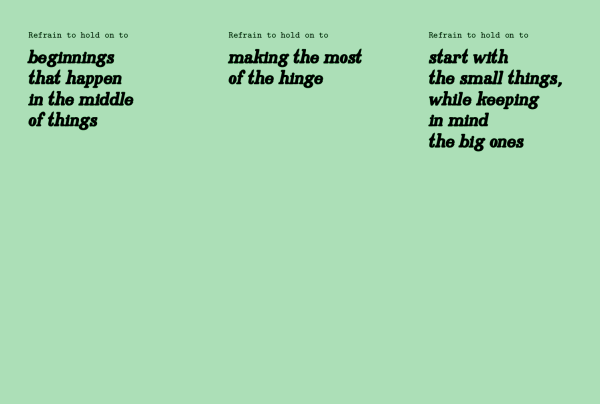Unfolding:FAQ: Difference between revisions
(Created page with "{{TT|FAQ}}") |
No edit summary |
||
| Line 1: | Line 1: | ||
{{TT| | __NOTOC__ | ||
<span class="bookcover">Infra­struc­tural</span><span class="bookcover floating">Inter­actions</span> | |||
<div class="pagebreak"></div> | |||
<div class="pagebreak"></div> | |||
{{TT|Gentle_Noise}} | |||
<div class="pagebreak"></div> | |||
{{TT|Introduction}} | |||
{{TT|Conversations}} | |||
<div class="section frits"> | |||
= Methods (or not) for Infra­struc­tural Inter­actions = | |||
{{TT|Peripheral politics}} | |||
</div> | |||
Revision as of 11:28, 10 May 2023
InfrastructuralInteractions
G3n7l3 N01s3
0r1g1n
Noisey craftmanship and colorful additions combined with vibrating hamburgers, mothers and hotdogs invite you to release the gentle noise. You can shape the noise by light and touch, using your fingery-ears.
The gentle noise project is spreading the idea of transforming what is considered waste into gentle noise. It started in Thailand as a part of funeral ceremonies using DIY audio technology. The artisanal approach is carried on in the project. Not only the sound but the means are unique to its creator.
About อาจารย์* Arnont
Arnont Nongyao lives in Chiangmai (TH) - Ho Chi Minh city (VN) and He is an artist interested and fell in love with the vibration of things. He likes listening to everything that inspires him to do experimental sound art. The most important teacher “the master Khvay Loeung "inspired him to listen and “destroy yourself from being yourself”[1]
A message from อาจารย์* Arnont:
.-.. .. ... - . -. -.-- --- ..- .-. ... . .-.. ..-.
A message from the synthesizers:
- .... .- -. -.- ... ..-. --- .-. - .... . ..-. ..- -.
- read: Ajahn, meaning Salutation for Teachers in Thai
a little story on generating gentle noise
It's a Tuesday afternoon in the HacketeriaLab in Zurich where 8 12 Volt Amusement Parks are being played. They all come in different shapes and sizes but tell a similar story.
It's a day full of scraps, connections, food and noise inbetween hammering, laughter and sharing concerns and apologies.
After a small removal of its third wire, a Kid gets to take a piggyback ride on its mom's shoulders.
The hopping and bending make them hungry and luckily there are a few options. The mom gets a positively charged hotdog with ketchup, mustard and black sesame seed mayo. Its a special Tuesday so the Kid gets chose what it wants to eat. First it choses to eat a pancake but soon enough realizes he needs more energy for the next ride. He goes with a negatively charged, hand flipped hamburger.
After a little rest they take the famous Jack Speaker Rollercoaster. The Sun comes out from behind the Clouds as it provides for positive vibrations and you hear children screaming as they're thrown up and down.
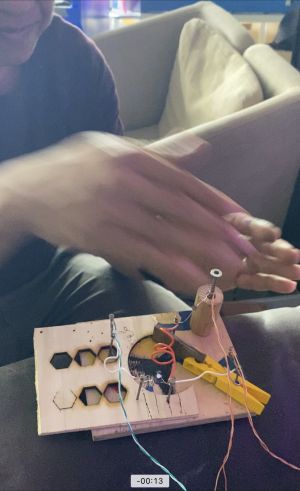
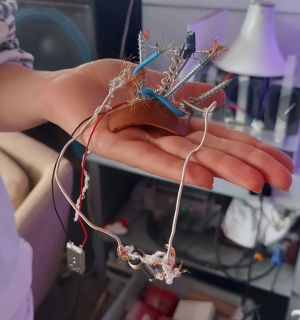
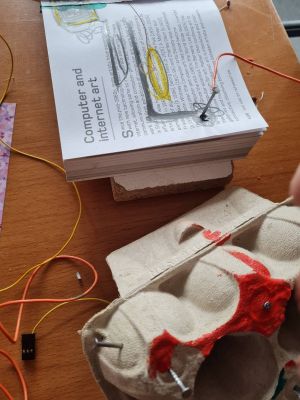
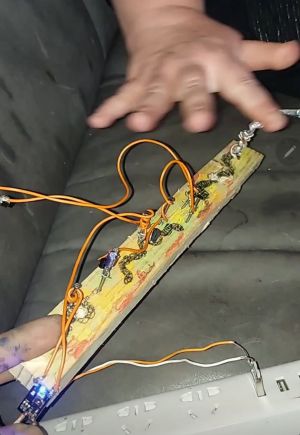
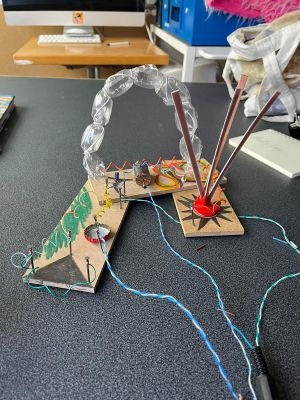
Infrastructural Interactions: Survival, Resistance and Radical Care
Cristina: Even if the infrastructure fails, there's all this imagery around it that connects to progress, ideas of progress, and ideas of modernity and that has a lot of rhetorical power. I think thinking about other ways politics or other ways of interacting with, of building an image around infrastructures is really valuable, actually. At least, for me, the most convincing that I've encountered, I don't know.
Clareese: Definitely, yes. I do agree too. Infrastructure or the idea that it's not going away, so how do you use it and make it useful to the people that it's supposed to act as a container or a boundary around?
Radical Care
As public health care nearly collapsed under pandemic pressure, schools closed and movement through public life became increasingly monitored and managed by digital infrastructures, we have been thinking with other collectives about radical alternatives to the need for care. For the last two decades, basic care provisions have been turned into tools that perform racial capitalism, excluding and punishing those who needed it most. What kind of solidarity and support can people extend and receive to one another that is outside the scope of the limits that are being imposed on us, from the voluntary duty of care to not expose one another, to a state supported obligation to function as a subject to capitalism? The fact that the pandemic made it impossible to come together physically to organise and to resist, triggered many discussions and reflections. When lockdowns immobilised a lot of the practical options that common people and ordinary working-class people have for resistance, which would be their bodies and the street, or meeting to make plans or to provide care for each other, cloud infrastructure has often been presented as the way forward — such as hosting organising over Zoom, using Google Drive to distribute materials or Uber to distribute care packages.
For the conversations and workshops that feature in this manual, we brought together people involved in alternative healthcare or other alternative care-structures, for example in the context of anti-fascist activism, or groups rethinking alternative technical infrastructures in terms of capacity and care. Without wanting to turn everything into infrastructure, we felt it was helpful to open up perspectives that point out the worlding qualities of caretaking, maintenance and instituting.
From survival to resistance in racial capitalism
As people who are active on the ground, but also intellectually, what do we imagine in terms of resisting and building alternatives for or to cloud infrastructures? What are our lived experiences with infrastructures that demand these alternatives? A question that came up often in our discussions and practices was whether this is a time of survival, or a time of resistance? Are the creative imaginaries we are exchanging, an example of resistance ... or are they actually about just surviving? We were interested in asking this question, because we know that people are sometimes using extractive services and apps, knowing very well that it's a risk, and that by using them, they're actually being exploited even more.
In the workshops, conversations and collective writing that generated this workbook, we have tried to think resistance under racial capitalism and issues around extractivism with participants from different geographies and practices. What are the material aspects of cloud infrastructures that are being imposed on us, during COVID-19 lockdowns and since? It felt these questions where erased from the debate, even among critical scholars working on technology, while obviously racial capitalism and extractivism are part of the conversation. This workbook brings attention to the ways in which computational infrastructures extend extractivism, from the mining of rare minerals for smart phones to the extractivist models of cloud-based services and the extension of Big Tech into the markets of care. To do so, we build on a body of literature pointing out the continuing geopolitical make-up of imperial and colonial power in the development of infrastructural technologies. In particular, Syed Mustafa Ali argues for a decolonial approach when designing, building or theorizing about computing phenomena and an ethics that especially decentres Eurocentric universals.[2] Paula Chakravartty and Mara Mills offer to think decolonial computing through the lens of racial capitalism.[3] Cedric Robinson argues that mainstream political economy studies of capitalism do not account for the racial character of capitalism or the evolution of capitalism to produce a modern world system dependent on slavery, violence, imperialism and genocide.[4] Capitalism is ‘racial’ in the very fabric of its system.[5]
The work documented in this workbook is embedded in a view that requires continuous undoing – a necessary but unfinished formal dismantling of colonial structures by decolonial resistance. Building on theories of racial capitalism, we focus on the implications of computational infrastructures and their relation with extraction, whilst working on ways to develop a non-extractive research practice.
What does Cloud infrastructure do?
Cloud infrastructures purposefully promote data intensive services running on the infrastructures, rather than pre-packaged and locally run software instances. These data-infrastructures range from health databases, border informatics, data storage warehouses, to city-dashboards for monitoring citizen flows, educational platforms and the optimisation of logistics. It has become common for theorists, activists, artists, designers and engineers that want to critique cloud services, to focus on the way they extract data from individuals, either for value or surveillance, or to automate services so that institutions can reduce workers rights or employ less people. The research we are doing at TITiPi however evidences quite clearly that this might not be the best way to understand what clouds are and how to resist and prepare for the massive shifts in public life they are and plan to make.
Instead, we propose that what we need to look at how Big Tech cloud services are financialising literally everything on a rentable model, thereby indebting institutions, communities and individuals to their values and services. Cloud infrastructures offer agile computational infrastructure to administer, organise and make institutional operations possible, decreasing the potential for institutions to manage their own operations, locking them into a cycle of monthly payable subscription agreements (debts) and rendering all operations from emptying bins, to paying bills, to hosting collaborative documents ready to be financialised by Big Tech cloud companies. They do this by promising a future of being able to fullfill the operations that institutions themselves might not even have imagined. By interfacing between institutions and their constituents through Software-as-a-Service solutions, they reconfigure the mandate of institutions and narrow their modes of functioning to forms of logistics and optimization.
As Big Tech extends into public fields, they tie together services across domains, creating extensive computational infrastructures that reshape public institutions. So the question is, how can we attend to these shifts collectively in order to demand public data infrastructures that can act in the "public interest"? And how can we institute this? Computational infrastructures generate harms and damage beyond ethical issues of privacy, ownership and confidentiality. They displace agencies, funds and knowledge into apps and services and thereby slowly but surely contribute to the depletion of resources for public life. While data- infrastructures capture public data-streams, they also capture imagination for what a public is, and what is in its interest. We urgently need other imaginations for how we interface with infrastructures, beyond delivering a “solution” to a “need” (or the promise they can fulfill a future need).
The workshops, documentation and structures in this workbook are a small contribution to making this complex paradigm shift together.
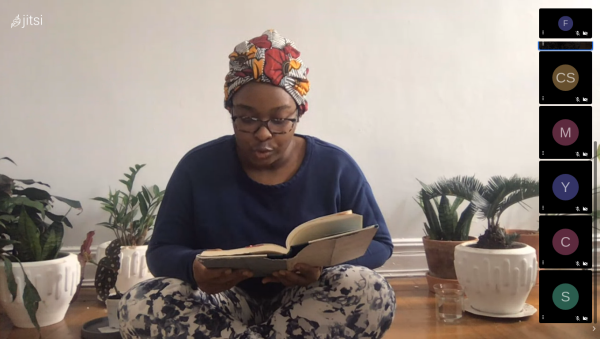
Research as kinship
Cloud infrastructures are typically hard to study and we need imaginative and collective methods to trace the long tail of their effects and make them legible. In the work of TITiPI and in this workbook, creative practice and collective organising is vital to restructure both the way we research and how we understand infrastructural implications. In the conversations and workshops, we attended to our companions' proposals for socially and technically remaking or resisting infrastructures. These conversations and workshops attended carefully to the shapes that we make for research to happen within and we resisted (where we could) using extractive cloud infrastructure. Instead the conversations and workshops took place using a patchwork of otherwise-hosted Free, Open Source softwares. This publication for example was made with an implementation of wiki-to-pdf, allowing the workbook to be collaboratively edited and published without needing to use graphics cloud based software such as Adobe Creative Cloud. Within the institute we are committed to shaping research differently, and we have a sneaky feeling that the possibility of our imaginations of different institutes and infrastructures are interdependent on the infrastructures we use to communicate, write, make and do research. So many tools and infrastructures for research are extractive, damaging and harmful, how come we so often ignore this part of the relationality? As Femke once said: "these tools are so banal people can't even bear to think about how they are shaping their research." So we also try to practice radical care here, to attend to the infrastructures we use and their extractive forces.
In the research that led to this manual we combined creative practice, queer theory, historical materialism, critical computing, together with approaches from infrastructure studies to disclose the shifts and damages of cloud infrastructures. In a series of conversations, we documented stories and experiments of inventive ways to trace and disclose these effects.
One of our strong motivations was to connect people through the research conversations and workshops. We wanted to start the conversations by asking questions, but also inviting our collaborator's, companions and future instituters to intervene in each other's answers or to frame the discussion with each other. This is also how this workbook was written. The workbook itself was composed together with artists, technologists and activists, committed to non- extractivist research practices for and with refugees, anti-racist, trans* health and sex work, and our hope is that through the workbook you will also get to know these different groups and networks. To get to know the imaginative ideas, suggestions and experiences, if you will, of The Institute for Technology in the Public Interest, and for our companions.
The transcultural and differently situated conversations that fueled this research, inquired into and documented creative and grassroots approaches for counter cloud infrastructures that are being built, or will need to be built. They revealed the intricate ways in which power asymmetries by design necessitate us to shift our critical analysis from the received idea that the main problems with cloud infrastructures and digitalisation are centered around personal data, privacy and surveillance, to a much more complex perspective that takes the political economy and financialisation of institutions operations of cloud infrastructures into account. Here we share some of the crossings from these conversations which get taken up in different ways throughout this workbook.
Infrastructural imaginary
Anita: What is missing in school is a discourse on algorithms, and the politics of the technical; there is no grounding of this in the everyday. It is admitted that tech questions are important but there is no concrete way to engage with it, it is not part of life. The researches that are happening on technology are always treating it as a topic: The Bot, The AI ... it is not part of normal life with technology. The workshops we are organising are grounded in choices we are living in, technologies we are using every day ... this is where connections are made.
Naomi: I think when it comes to anti-fascist politics, it's not actually just the infrastructure of the street that you're working to remove from fascist organising.
Arun: The question is how do we keep fighting for the near future? Black Lives Matter is quite a broad open space as a physical concept. The physical concept is very broad. It can mean, the thing that Google puts out saying, we support Black Lives Matter, or it can mean Ruth Gilmore's idea of abolition and ending racial capitalism. It's a massive spectrum. The question is, how do we create organisational infrastructure to make sure it's the second of those and not the first? That seems to be the problem across the board in terms of radical politics.
Miriyam: Yes.
Seda: Now you know why we're called The Institute.
Arun: Yes.
Seda: Nothing more, nothing less.
Arun: Thank you. There you go. I set it out for you nicely, right?
From survival to resistance in racial capitalism
Arun: For certain communities, just defending your own sociability relationship is itself political. Just to keep either alive and survive is itself political because you have a community politics history that is already there. So in keeping the community alive, you keep that politics alive.
Miryam: Obviously, also a very important theme is resistance. What forms of resistance have people managed to design or come up with or discover? As they say, need is the mother of invention, the father of invention, the grandmother of invention.
Seda: The cousin.
Miryam: The cousin. Everything. It's through needs. Working-class people, it's through need that they come up with. It's not some blueprint thing that some very smart organisation told them to think about making and developing. It's resistance is one of the themes as well. I think these are roughly the themes that we had thought of.
Radical care
Nadia: Yes, radical care is a big question. In the group that I'm following of the families, I think for me the radical care is really in the WhatsApp group of the grandmothers who send each other. One of them sends the other mothers every morning a good morning and she says “bonjour les mamans” every morning and asks the mothers how they are doing. These are all people who haven't seen their children or grandchildren for more than eight years. Who don't know whether they will see them back, who have lost children and grandchildren also in many cases and the kind of daily hope basically of trying to keep hope alive.
Sometimes it comes up, sometimes it goes down, and then they started basic stuff like saying hi to each other every morning and then it's followed by hearts and emoticons and these kinds of things. Emoticons play a very important role in the WhatsApp group. I'm always impressed. It's very stupid but I'm always impressed by the tenacity of it.
Methods (or not) for Infrastructural Interactions
Peripheral politics
A workshop with Helen V. Pritchard and Femke Snelting
"As such, urban politics will largely be a peripheral politics, not only a politics at the periphery, but a politics whose practices must be divested of many of the assumptions that it derived from the primacy of 'the city'.”[6]
During this on-line session, we worked with eight conversations on infrastructural shifts that TITiPI had organised with companions in the months before. To attending to the stories that were told and the surprising details that came up through the rhythm of three refrains, was an attempt to listen for the experiences of living with infrastructure but also for other worlds of radical care and different temporalities not defined by Big Tech infrastructure nor by academic methods, worlds that are already here, that are already being practiced.
In this workshop, we tried not to fall for the suggestion of a coding or analysis that might make sense of transcripts from the outside, we listened together to generate a poetic-theory of infrastructure. We generated an understanding that was feeling into the surges of life, or what AbdouMaliq Simone calls "the rhythms of endurance with infrastructure".[7]
We borrowed the idea of 'refrain' from Kara Keeling who suggests that we need to be attentive to another world that is possible because it is already here.[8] Sensing the different organizations of things, different systems of signification and value, so much so that it might give way to the another world. Sung in the refrains with other temporalities and coordinates, yet already here.[9]
Perhaps this world gives way in the peripheries, AbdouMaliq Simone reminds us of the importance of what he calls a 'peripheral politics', of a-centric practices and rhythms: "[s]urges of rhythm emerges from attempts to reach beyond the confines of limited places and routines, and yet retains a microscopic view of the constantly surprising details about the places that could be left behind".[10]
The workshop 'Peripheral Politics' was a way to organise and categorise research material not based on the extraction of meaning but on the collective listening and responding-too through a set of interconnected prompts. The transcriptions opened up onto urgencies, repetitions of stories, giving ways to other worlds, partially told.
Peripheral listening
- Hold a series of open conversations with companions and associates on a subject matter that is felt as urgent, but which is not yet fully seen or comprehended.
- Transcribe the conversations or ask a companion to do so.
- Invite everyone that participated in the conversation for a two hour workshop.
- To keep a shared rhythm whilst reading, propose a set of three 'refrains' as things to hold while reading, listening and responding to the material. These 'refrains' can be quotes, phrases or aphorisms that intuitively resonate with the transcriptions.
- Publish each conversation on an on-line notepad such as etherpad, or print them out on paper in case you are all in the same room.
- Split up in small groups (two or three people) and chose one conversation. In case of an on-line workshop, also open a channel by which you can hear each other. Many on-line video-services have a breakout-room feature but this adds a layer of efficient management that might be blocking the exercise.
- Choose together one of the refrains to hold on to.
- One person reads the conversation out loud while the others use the chat function to simultaneously associate, rhyme and respond alongside the conversation. For IRL, use pen and paper.
- Experiment with selecting parts of the interviews through a collective process that resisted more extractivist ways of coding, sorting and labeling.
- Create a series of poetic openings and peripheral attention in the margins of the transcripts by listening to to the material in this indirect way.
- After 20-30 mins, take a short break and change roles at least once.
- If you've got time, regroup and refrain another conversation using the same method.
- Come back together and discuss.
Refrain to hold on to: beginnings that happen in the middle of things
a little song, a nocturnal creation myth or ‘sketch’ in the middle [...]; it is not a genesis story of the logos and light, but a song of germination in darkness [...] I begin with it because doing so calls attention to the improvisational elements of any beginning, which always happens in the middle of other things.
Kara Keeling, Queer Times, Black Futures
Refrain to hold on to: making the most of the hinge
Here, the surge as rhythm emerges from attempts to reach beyond the confines of limited places and routines, and yet retains a microscopic view of the constantly surprising details about the places that could be left behind. This is a rhythm of endurance, of surging forward and withdrawing. It is not a rhythm of endless becoming nor of staying put; it is making the most of the “hinge,” of knowing how to move and think through various angles while being fully aware of the constraints, the durability of those things that are “bad for us” (Stoler 2016).
AbdouMaliq Simone, Improvised Lives
Refrain to hold on to: start with the small things, while keeping in mind the big ones
Any "archipelagic" thought is a trembling thinking, it is about not-presuming, but also about opening and sharing. We do not need to define a Federations of States first, or to install administrative and institutional orders. It already begins its work of entanglement everywhere, without being concerned with establishing preconditions. As far as our relations in the Archipelago are concerned, let us start with the small things, while keeping in mind the big ones.' (Toute pensée archipélique est pensée du tremblement, de la non-présomption, mais aussi de l'ouverture et du partage. Elle n'exige pas qu'on définisse d'abord des Fédérations d'États, des ordres administratifs et institutionnels, elle commence partout son travail d'emmêlement, sans se mêler de poser des préalables. S'agissant de nos rapports dans l'Archipel, commençons par les petites choses, tout en ayant en l'esprit les grandes.)
Edouard Glissant, Traité du tout monde
Print out refrains: http://titipi.org/projects/infrastructuralinteractions/refrains.pdf
Transcript marginalia from the workshop
Refrain: "start with the small things, while keeping in mind the big ones"
- F: among the group is in your world
- F: everywhere ceasing the moment
- F: many chats i am in
- F: multiplicity access points
- F: distributing power
- F: (i am losing your voice...)
- F: a secret account
- F: not a time of purity
- Y: you are assigned a character
- Y: make the best of what was around
- Y: repurpose tools
- Y: continue gathering despite restrictions
- Y: staying connected to the community
- Y: think about who else may benefit from resources
- Y: recurrence, word of mouth gives rise to solidarity
- F: starting a month after
- F: confused joining, solidarity based on that
- F: a union with new people starting on chat
- F: it starts with someone needing a hammer
- F: it starts with someone needing a test
- F: it started with people having trouble paying rent
- F: it started with things that did not stop
- F: it started on tuesday
- F: a chat and doubt
- F: releasing documents
- F: organizing that starts with a stat
- F: chat
- F: it starts with breaking up
- F: intensity of seeing the fascists (not) go
- F: tech and having time
Refrain: "making the most of the hinge"
- H: waves of the lunch break
- H: closely connected
- H: what technology does in a particular situation
- H: not the generic one
- H: ongoing work
- H: being between many projects that are close too
- H: processing ways
- H: vernacular play
- H: collective moments of togetherness
- H: collective infra.. the act of doing
- U: hinge: capacity/ongoingness/different frames
- U: they get funds for doing ceretin kind of work
- U: on the one hand
- U: on the other hand
- U: not really a coincidence
- U: exchanging ways tactics for refusal
- U: at the same time have been really amazed
- U: they are just right at surface
- U: even though we don t see them
- U: are we funding these interactions
- U: feeding back into funding
- U: ////
- H: --live experience of the hinge--
- H: --reshaping one hinge into another---
- H: not a conincidence
- H: contradictions come with it
- H: if you decided to be the displacement between different places. people, you maintain this there is always contradictions you are holding onto something
- H: working as a hinge
- H: bringing it up
- H: rather than being an underground hinge
- U: different infrastructures were the hinges
- H: carries weight to make the movement possible
- H: out of proportion movement possible
- H: //////
- H: our relationships
- H: shock level
- H: shock crisis
- H: looking out for each other
- H: confidence of fascism
- H: ---
- H: spending money and how it creates oppositional to your wellbeing
- H: the school, the funding,
- H: how close to supporting this movement
- H: chicken sandwiches
- H: chickfill a funding inserruction
- H: where is my money being spent going
- H: to the radical institutions that work against me
- H: this moment has made everyone stop and consider where the money
- H: --- through the chicken s/w story---
- H: the hinge becomes visible
- H: by making it into a story you are making the most out the uncovering the hinge
- U: a lot of work lately, this mic
- U: there is no real prescription
- U: training in on sylvia winter
- U: (AI)
- U: these walls are problematic now with COVID
- U: we also need
- U: making people comfortable
- U: have to do something either way
- U: maybe classroom is the garden
- U: sylvia wynter is the hinge
- U: making the most of something
- U: even though crushed in this hinge
- U: we are gonna have to do something
- H: Sylvia Wynter as the hinge
Refrain: "making the most of the hinge"
- H: it seems important the awareness of the constraints
- H: as that isn't always there
- H: organsiing through fb there is a degree of accepting the problematic parts because the trade is neccessary
- H: it comes with a frame that might twist against you
- M: hinge that can empower to think beyond the frame/constraints?
- H: being aware that whilst looking through the different angles
- M: in this case fb is the frame, oraganizing is the hinge
- M: taking care of eache other during the demonstrations
- M: doing the right thing partially
- M: close to each other
- M: different ways of doing food distributions anyway
- M: big lineups outside
- M: everymorning a good morning
- M: daily hope og trying to keep hope alive
- M: started basic stuff
- M: impressed by the tenacity
- M: people were not allowed to gather
- M: and they did it anyway in didferent ways
- M: managed to do it in a way that was respectful
- M: deliver food
- M: families who couldn't make it or who had quite a lot
- M: emojis are undervalues [laughs]
- M: they have not given up on their families
- M: outside the scope of the state because it was needed
- H: not hiding for what is the basic keeping in touch
- H: sending hearts as a daily refusal of the state
- H: included laughter
Refrain: "beginnings that happen in the middle of things"
- F: always with these things
- C: angled points
- F: already important
- C: complicit kinship
- F: waiting not waiting not to be repatriatiated
- C: implicit level of technology
- F: accelerated means able to organise
- C: own lived experience with technology (as a shifting, trembling thing)
- F: being exposed to
- F: since it arrived it shifted it is different
- C: shifted by the pandemic
- C: crisis as a moment to atomise that does not lead to resistance
- F: when it is like that there is no resistance
- F: when it happened here
- C: similar things happening in other parts of the world
- F: when it happened in other places in the world
- F: when it happened on the street
- ↑ http://www.arnontnongyao.com/about.html
- ↑ Ali, S. M. (2016), ‘A brief introduction to decolonial computing’, XRDS: Crossroads, The ACM Magazine for Students, 22:4, pp. 6–21.
- ↑ Chakravartty, P. and Mills, M. (2018), ‘Virtual roundtable on decolonial computing’, Catalyst, 4:2, p. 14
- ↑ Robinson, C. ([1983] 2000), Black Marxism: The Making of the Black Radical Tradition, Chapel Hill, NC: University of North Carolina Press
- ↑ Bhattacharyya, G. (2018), Rethinking Racial Capitalism: Questions of Reproduction and Survival, Lanham, MD: Rowman & Littlefield.
- ↑ AbdouMaliq Simone, Improvised Lives (Polity Press, 2019)
- ↑ Simone, Improvised Lives.
- ↑ Kara Keeling, Queer Times, Black Futures (New York: New York University Press, 2019).
- ↑ "The generative proposition another world is possible, the insistence that such a world already is here now and it listens, with others, for the poetry, the refrains, the rhythms, and the noise such a world is making." (Keeling, Queer Times, Black Futures)
- ↑ Simone, Improvised Lives
